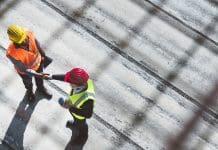The Construction Leadership Council (CLC) will unite a panel of technical and industry experts in response to the RAAC crisis
A CLC expert panel will support the government in responding to the Reinforced Autoclaved Aerated Concrete (RAAC) crisis, as more buildings in the public sector are revealed to be at structural risk.
After over a hundred schools were told to make alternative arrangements for teaching due to the imminent structural risk of deteriorating RAAC panels, questions are being raised about how to respond.
Theatres in Dartford, Northampton and Carlisle have been closed due to the RAAC risk. Prisons and shopping centres are also said to be at risk. Seven hospitals are already being rebuilt at a cost of £20bn.
The CLC RAAC expert panel will deliver support in two phases
The CLC will form a technical expert panel of industry experts and representatives from professional bodies, co-ordinated by Graham Watts, a leader of the CLC’s Building Safety workstream, to lead a single industry response.
Mr Watts said: “While we anticipate that the majority of buildings that contain RAAC will remain safe, there is an urgent need to identify and remedy any risks to the public. As an industry we will support the programme of expert assessment of structures, both public and private, to identify where RAAC has been used and to deal with it to make it safe.”
Firstly, the CLC will assess the current situation and risk levels via the RAAC expert panel. Designing and delivery of any remediation programmes across the public sector estate will follow.
“We will be setting up two groups to take this work forward a technical expert panel to co-ordinate our cross-industry response, as well as a communications group,” he continued. “We will be confirming the full membership of both groups shortly, and their work will start immediately.
A communication and external engagement group will work with industry and building owners to ensure accurate information and guidance is accessible and implemented. Short-term support will likely include the provision of temporary buildings and ensuring the competence of inspectors.
“I want to also take this opportunity to offer my thanks for the number of companies and organisations that have proactively approached the CLC with offers of help and support”, Mr Watts concluded.
Creating a ‘cross-sector response’
CLC co-chair Mark Reynolds said: “The construction industry has a responsibility to ensure the safety and the confidence of the public in the buildings that are a part of the fabric of their daily lives.
“The CLC is working to co-ordinate a cross-sector response; marshalling technical expertise and industry capacity to support the Government and building owners to develop an effective programme to assist with prioritising and mitigating the risks; and developing plans to remediate buildings where required.”

















